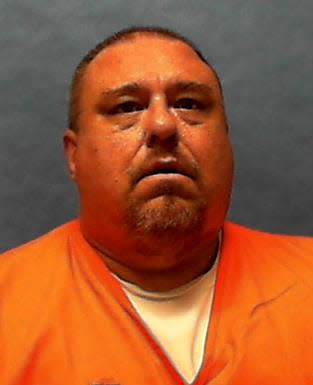Serial killer Frank Walls ruled smart enough to be held responsible for 1980s-era murders
SHALIMAR — More than 33 years after he arrived on death row in August 1988, Frank Walls, Okaloosa County's most notorious serial killer, might have run out of arguments as to why he should be spared paying the ultimate price for his crimes.
He has not, however, run out of appeals, and last week's decision by Okaloosa County Circuit Court Judge William Stone to deny Walls' claim that an "intellectual disability" should prevent the state from putting him to death likely will be appealed at both the state and federal levels, according to Assistant State Attorney John Molchan.
Nonetheless, Stone's detailed order denying Walls' motion at the trial court level constituted a "significant achievement," Molchan said, for himself and the team of First Judicial Circuit prosecutors who worked to convince the court of the falsity of Walls' claims.
Walls was 20 in 1988 when he was originally sentenced to death for the killing of Ann Louise Peterson, who died alongside her boyfriend Edward K. Alger during a robbery at their Ocean City-area house trailer.

From January 2019: Walls competency hearing set — for 2020
Related: Cold case solved: Suspects in 2005 Fort Walton Beach shooting now in custody
Walls received a sentence of life in prison for the murder of Alger and for the killings of three others he would later confess to.
In 1993, a grand jury indicted Walls for the murder of 47-year-old Audrey Gygi, who was stabbed to death inside her trailer on Duval Street sometime between late Tuesday, May 19, 1987, and early the following day. Gygi's trailer was a block away from the one Alger and Peterson would be killed in on Jackson Street later that summer.
Walls agreed to plead no contest to the Gygi murder in a deal that ensured he would not receive a second death sentence. At that time he also acknowledged killing Tommie Lou Whiddon and Cynthia Sue Condra.
Whiddon’s throat had been slashed in the spring of 1985 when Walls happened upon her as she sunbathed on Okaloosa Island. He was on the beach doing community service for crimes that included cruelty to animals and peeking into people's windows, authorities said.
Condra, a 24-year-old mother of three, was stabbed 21 times on Sept. 16, 1986. Walls left her body in a wooded area off Lewis Turner Boulevard.
Related: 'Fresh look' at decades-old crimes: OCSO cracks five cold cases in nine months using DNA
All of Walls' crimes were in some way sexually motivated, according to Dennis Haley and Don Vinson, two law enforcement officers who investigated the killings.
Walls had to be retried shortly after the original conviction when an appeals court threw out the first verdict. He was convicted in the second trial, re-sentenced to death and sent back to death row in 1992.
He's been fighting to have the death penalty overturned ever since.
The hearing on Walls' intellectual disability claim was held between June 29 and July 7, court documents show. It originally had been scheduled for hearing in February 2017.
It became necessary following a 2014 U.S. Supreme Court determination that Florida acted unconstitutionally by using a single “bright line” IQ score of 70 to determine whether a killer could be put to death. That opened the door for death row inmates with IQ’s hovering around 70 — Walls had been determined to have an IQ of 72 — to present their case for intellectual disability.
The Florida Supreme Court stated following the U.S. Supreme Court decision that Walls should receive a hearing on his motion for reconsideration due to intellectual disability even though it was filed following the U.S. Supreme Court decision that the 70 IQ bright line was unconstitutional.
But it would later change course and say the Walls case did not have to be heard retroactively. Stone, however, ruled that since he already had committed to a hearing that one could be held.
Although Stone stated in his final ruling that the fact that Walls' case couldn't be heard retroactively had led him to reject the intellectually deficient claim. He also spelled out in a 21-page ruling why Walls' argument didn't work.
Stone took particular interest in arguments by the prosecution that for most of his young life, from childhood into adolescence, he had tested around 100 on IQ tests. His scores, experts testified, dropped by an unheard of 29 points only after he was incarcerated and sought an intellectually disabled defense.
Prosecutors also produced phone records from Union Correctional Institution where Walls is sentenced in which he discussed with family members his weight concerns and a diet regimen.
A prosecution expert testified that when he later asked Walls about his height and weight, Walls consulted a badge to provide the information, "which was a big red flag for me," Stone wrote in his ruling, paraphrasing the expert witness.
"The most credible explanation for the decline shown in IQ scores in 1991 and 2006 is an intentional underperformance by defendant," Stone wrote.
Walls' team of experts also testified that their client struggled with "adaptive" behaviors that included things like speech and memory. Stone found that while there was some evidence of struggles with adaptive behavior, Walls' "adaptive deficiencies are not of a severity that would suggest his intellectual functioning is comparable to that of a person with significantly subaverage intellectual functioning."
This article originally appeared on Northwest Florida Daily News: Judge rejects serial killer Frank Walls bid to overturn death sentence
